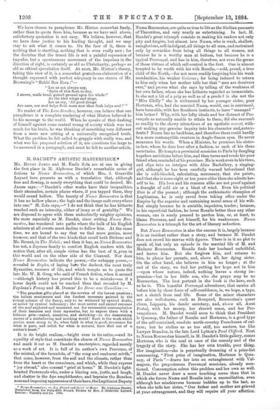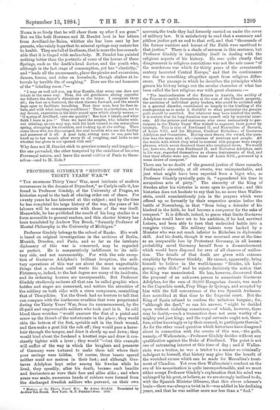M. DAUDET'S ARTISTIC MASTERPIECE.* MR. HENRY James and M. RD:rifle
Zola are at one in giving the first place in M. Alphonse Daudet's remarkable series of fictions to Numa Bountestan, of which Mrs. J. Granville Layard here presents us with a translation that, although free and flowing, is nearly everything that could be desired. Mr.
James says :—" Daudet's other works have their inequalities, their ahomalies, certain places where, if you tapped them, they would sound hollow. The beauty of Numa Boumestan is that it has no hollow places ; the logic and the image melt everywhere into one." M. Zola says,—" I do not think that he has hitherto reached such an intensity, either of irony or of geniality." We are disposed to agree with these undoubtedly weighty opinions, the more especially as M. Daudet, since writing Numa Ron- onestan, has wandered into paths where the bulk of his English admirers at all events must decline to follow him. At the same time, we are bound to say that we find more genius, more humour, and that of the two kinds that recall both Dickens and Mr. Besant, in The Nabob ; and then it has, as Numa Bourn estan has not, a Joyeuse family to comfort English readers with the notion that, after all, simple virtue has the best of it, .even in this world and on the other side of the Channel. Nor does Nama Roumestan indicate the power,—the unhappy power,— revealed in Sap/to, of laying bate the darkest, the most truly Byzantine, recesses of life, and which tempts us to quote the late Mr. W. R. Greg, who said of French fiction, when it seemed —although history has proved this to be a mistake—as if a lower depth could not be reached than that revealed by M. Feydeau's Fanny and M. Dumas' La Dame au. Camelias :—
"The grandest gifts placed at the service of the lowest passions; the holiest sentiments and the fondest moments painted in the richest colours of the fancy, only to be withered by cynical doubt, or soiled by cynical indecency ; the most secret and sacred recesses of the soul explored and mastered, not for reverential contemplation of their beauties and their mysteries, but to expose them with a hideous grin—naked, sensitive, and shrinking—to the desecrating sneers of a misbelieving and mocking world ! Such is the work which genius mast stoop to do, when faith in what is good, reverence for what is pure, and relish for what is natural, have died out of a nation's heart."
It is its bright realism,—bright even in its satire,—and its equality of style that constitute the charm of Numa Boum,estan and mark it out as M. Dandet's masterpiece, regarded merely as a work of art. It is full of its author's own Provence, of the mistral, of the farandole, of" the song and sunburnt mirth," that come, however, from the soil and the climate, rather than from the heart or the conscience, and which, while they express joy abroad," also conceal "grief at home." M. Daudet's light- hearted Provencals who, under a blazing sun, jostle, and laugh, and chatter in the Aps amphitheatre, and bepraise the Bourbon nose and imposing appearance of their hero, the Legitimist Deputy
• NUM,' Bvioneatan; r , Jou Abroad and Grief at Home By Alphonse Daudet. TransInted trout the Sixty.ilfth French Edition by Mrs. J. Granville Layard. London : Vizetally and Co. leak Numa Roumesta,n, are quite as true to life as the Sicilian peasants of Theocritus, and very nearly as entertaining. In fact, M. Daudet's great triumph consists in making his readers not only pity and forgive, but almost love Numa, who is weak, shallow, vainglorious, self-indulgent, all things to all men, and restrained only by cowardice from being all things to all women, not because he is a worthy man at bottom, but because he is a typical Provencal, and has in him, therefore, not even the germs of those virtues of which self-control is the first. One is almost tempted to be wroth with his wife Rosalie,—cold, proud, a true child of the North,—for not more readily forgiving him his weak mendacities, his weaker liaisons ; for being induced to return to him only when her mother tells her that "men are deceivers ever," and proves what she says by telling of the weakness of her own father, whom she has hitherto regarded as immaculate. Is she not a bit of a prig as well as of a prude P is she not the "Miss Chilly" she is nicknamed by her younger sister, poor Hortense, who, had she married Mum, would, one is convinced, have been able, with her Southern instincts, to have " managed " him better P Why, with her lofty ideals and her distrust of Pro- vencals as naturally unable to attain to them, did she succumb so readily to the showy attractions of an egotistic avocat, with- out making any genuine inquiry into his character and,antece- dents P Numa has no backbone, and therefore there could hardly be a more contemptible creature in Anglo-Saxon eyes. He never measures his words. When a Minister, he promises his sister- in-law, whom he does love after a fashion, to each of his three secretaries. He tempts a provincial musician to Paris by dangling hopeless ambitions before him, and then turns and rends his poor friend when reminded of his promises. He is weak even in his vices, and slips into an intrigue with Alice Bachellery, a singing- girl, although he has been carefully warned beforehand that she is cold-blooded, calculating, mercenary, that she paints, and that she is some eight or ten years older than she admits her- self to be. His love and his remorse alike are not proof against a draught of cold air or a blast of wind. Even his political fibre is of the poorest ; although the enthusiastic champion of Legitimism, he is only saved from taking office under the Empire by the superior and restraining moral sense of his wife. But simply because he is amiable, impulsive, tender ; because, in his superficial fashion, he loves Rosalie better than any other woman, one is sorely pressed to pardon him, or, at least, to blame Provence, and not himself, for his weaknesses. Numa Boumestan is a triumph for the art of literary seduction.
But Nuvta Bountestan is also the success it is, largely because it is an incident rather than a story, and because M. Daudet does not crowd his canvas with figures. There is in it no plot to speak of, but only an episode in the married life of M. and Madame Roumestan. Rosalie finds her husband unfaithful, and leaves him. But she forgives him, and returns to him, to please her parents, and, above all, her dying sister. On the other hand, she believes in him no longer ; at the end of the story, we find her putting her hope not in him —upon whose nature, indeed, nothing leaves a strong im- pression—but in her little son, who she prays may be no Rottmestan. The best portrait in the book is the hero, such as he is. This boastful Provencal adventurer, that carries all before him by sheer force of self-confidence, is, we hope, a type, not a sketch from real life. Some of the minor characters are also well-drawn, such as Botnpard, Roumestan's queer chum, Lappara, his dandy secretary, and, above all, Aunt Portal, with her money, her shrewd sense, and her Pro- vencalisms. M. Daudet would seem to think that President le Quesnoy, the father of Rosalie and Hortense, is a good type of the self-contained, resolute north-country Frenchman of cul- ture; but he strikes us as too stiff, too austere, too like Lawyer Brandon, in the late Lord Lytton's Paul Clifford. Next to Numa Roumestan himself, in M. Daudet's little gallery, comes Hortense, who is the soul at once of the comedy and of the tragedy of the story. She has her own trouble, poor thing. Her imagination—she is perpetually dreaming of a prize-list announcing, "First prize of imagination, Hortense le Ques- noy, of Paris "—draws her into an entanglement with Val- majour, the preposterous Provencal musician, already men- tioned. Consumption solves this problem and her own as well. M. Daudet never drew a more touching scene than that in which she forces Numa and Rosalie into a reconciliation, even although her mischievous humour bubbles up to the last, as when she tells her sister, " Our father and mother are grieved at your estrangement, and they will require all your affection.
Numa is so lively that he will cheer them up after I am gone." But we like both Hortense and M. Daudet best in her letters from Arvillard-les-Bains, whither she has been sent by her parents, who vainly hope that its mineral springs may restore her to health. They are full of liveliness, that is none the less remark- able that it is tinged with melancholy. M. Daudet has painted
nothing better than the portraits of some of the heroes of these Springs, such as the death's-head doctor, and the youth who, although in the last stage of consumption, yet has "elasticity," and "leads all the amusements, plans the picnics and excursions, dances, fences, and rides on horseback, though shaken at in- tervals by terrible fits of coughing." Here are the sad humours of the "inhaling room
"I may as well tell you, my dear Rosalie, that every one does not inhale in the same way. Thus, the old gentleman sitting opposite me follows the doctor's directions to the letter. I recognise them all ; the feet on a footstool, the chest thrown forward, and the mouth kept open to facilitate breathing. Poor dear man, how be does in- hale, and with what touching confidence ! There is a credulous, not to say devout, expression in his little round eyes which clearly means,— ' 0 spring of Arvillard, cure me quickly ! See how I inhale, and what faith I have in you !' Then we have the sceptic, who inhales with- out inhaling, as one may say, with his back turned to the miraculous spring, shrugging his shoulders, and looking up at the ceiling. Then come those who are discouraged, the real invalids who see the futility and nonsense of it all. A. poor lady, sitting next to me, puts her hand up to her mouth after every fit of coughing, and looks to see whether her glove is not spotted with red."
Why does not M. Daudet stick to genuine comedy and tragedy,— the one pervaded, the other tempered by the sunshine of his own Provencal nature, and leave the moral cretins of Paris to them- selves—and to M. Zola



































 Previous page
Previous page